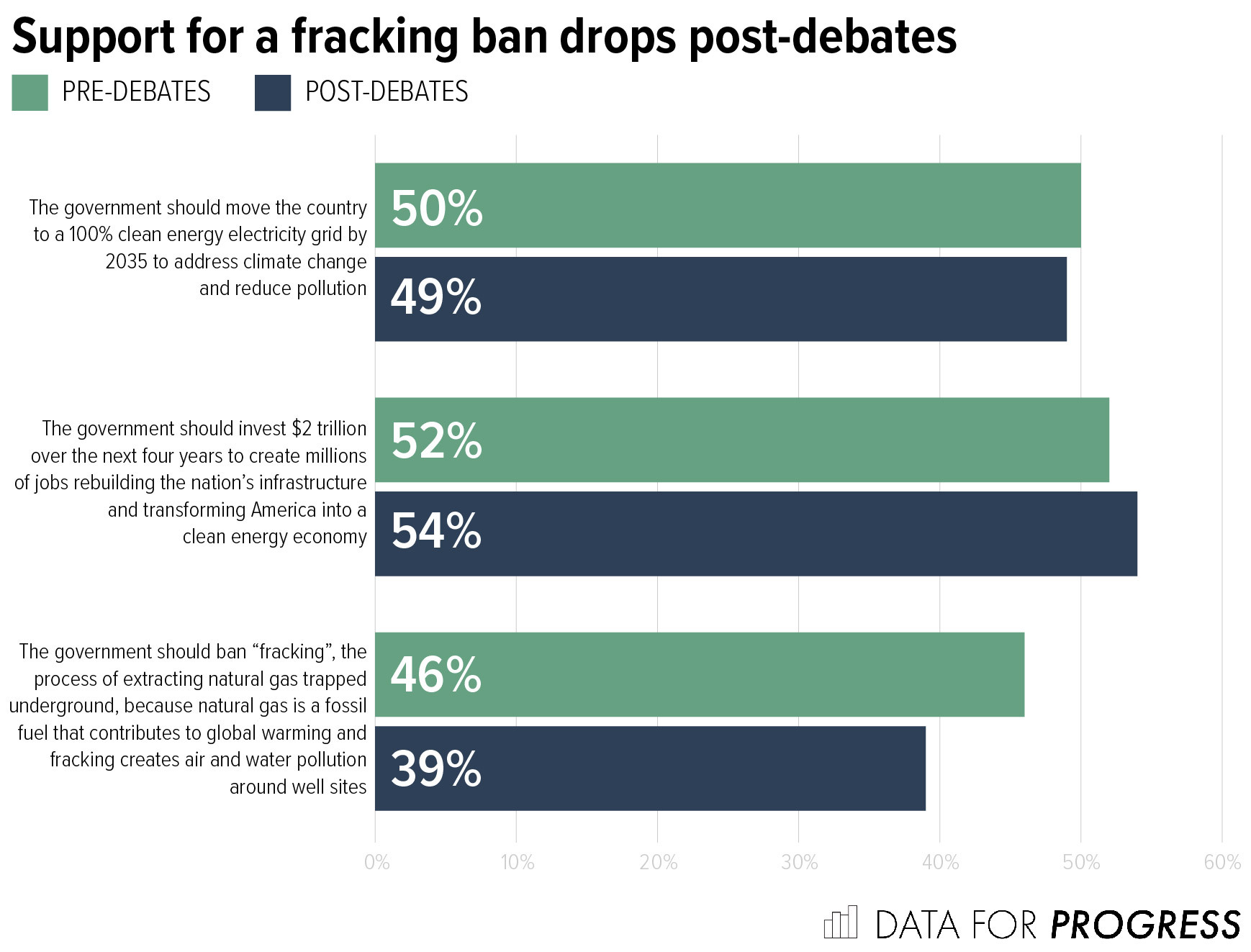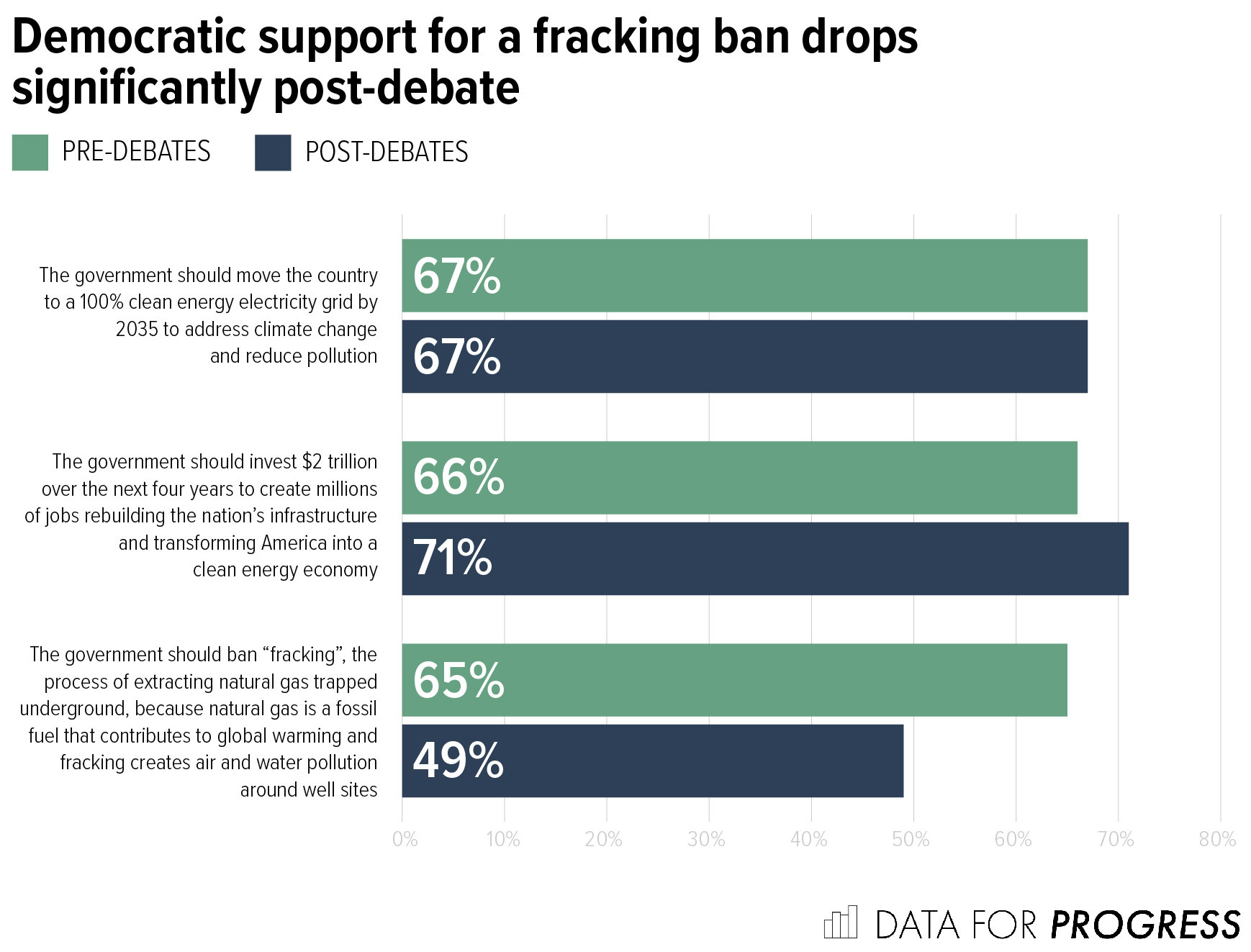One of President Donald Trump and Republicans’ favorite hobby horses on the campaign trail is the absurd notion that Joe Biden and Democrats would subject Americans to a “radical socialist Green New Deal.” The Grand Old Party would like voters to believe that Democrats are just an election away from abolishing hamburgers, pickup trucks, and airplanes, sending electricity bills through the roof, and putting all the workers on unemployment insurance. Both Trump and Vice President Mike Pence hurled these familiar attacks against former vice president Joe Biden and Senator Kamala Harris during the presidential and vice presidential debates. While Data for Progress has observed that voters in fact support Biden’s plan for a massive investment in clean-energy jobs and do not believe Trump and Republicans’ Green New Deal smears, a key sticking point on the issue of fracking remains.
As a reminder, hydraulic fracturing—aka fracking—involves shooting fluid into the earth to fracture shale rock and release natural gas. In the mid-2000s, a fracking boom began in Pennsylvania’s resource-rich Marcellus Shale formation. Aided by Obama-era policies—including loads of cheap debt—the natural gas industry created over 10,000 jobs in Pennsylvania between 2007 and 2012, according to the Bureau of Labor Statistics.
This boom came with significant costs to the environment and public health. Fracking requires large amounts of water—up to 9.6 million gallons per well, according to the US Geological Survey. Wastewater can contaminate surface water, while toxic chemicals involved in the extraction process have been found in aquifers. Fracking also releases noxious fumes that can cause respiratory and cardiovascular problems as well as cancer and birth defects. Research has shown that fracking fluid injection has induced earthquakes as large as 5.8 on the Richter scale. And while fracking was once considered a “bridge fuel” to renewable energy, recent studies suggest that methane flaring and leakage from fracked gas may be larger than previously thought. In sum, this isn’t an ideal activity amid a respiratory-related pandemic and a world-historic climate crisis.
Unsurprisingly, fracking has become one of the defining issues in the fight for Pennsylvania’s 20 Electoral College votes, which went to Obama in 2012 and were key to Trump’s narrow victory in 2016. Aware that Trump and Republicans are eager to brand Biden and Democrats as job-killing hippies, Biden and Harris have made it clear on multiple occasions that they would not ban fracking. (Never mind that a president can’t do that without Congress.)
Popular
"swipe left below to view more authors"Swipe →
In two polls of likely voters nationwide, one conducted just days before the first presidential debate, and one immediately following the vice presidential debate, Data for Progress asked voters the same set of questions about three climate policies: Achieving a 100 percent carbon-pollution-free electricity grid by 2035, a $2 trillion investment in new clean-energy infrastructure, and a ban on fracking. To measure how these policies might fare when faced with attacks, we presented voters with two different statements—one in favor of the Biden policy and one against it—and asked them to choose which they agreed with most. The exact wording of these questions is reprinted below:
1. Which statement comes closer to your view?
• The government should move the country to a 100% clean energy electricity grid by 2035 to address climate change and reduce pollution.
• The government should keep our current system where we use coal, oil and natural gas, as well as clean energy sources, to generate electricity based on what keeps energy prices low.
• Don’t know
2. Which statement comes closer to your view?
• The government should invest $2 trillion over the next four years to create millions of jobs rebuilding the nation’s infrastructure and transforming America into a clean-energy economy.
• The government should not waste $2 trillion dollars on politicians’ pet projects because it is wasteful government spending that will dramatically increase the national debt.
• Don’t know.
3. Which statement comes closer to your view?
• The government should ban “fracking,” the process of extracting natural gas trapped underground, because natural gas is a fossil fuel that contributes to global warming and fracking creates air and water pollution around well sites.
• The government should not ban “fracking” because the natural gas industry employs hundreds of thousands of workers in good-paying jobs and natural gas is a cheap energy source that is much cleaner than other fuels like oil and coal.
• Don’t know.
Responses showed a slight but statistically significant movement on these climate policies as voters took cues from their party’s leaders. Among all voters, support for a 2035 clean-electricity standard remained essentially constant before and after the debate at about 50 percent. Support for a $2 trillion clean-energy infrastructure investment grew slightly, from 52 to 54 percent, though this was within the margin of error. And, most notably, we observed significant movement away from a fracking ban, support for which dropped seven points, from 46 percent before the debates to 39 percent after them.
N

N
These trends are more pronounced among voters who self-identify as Democrats. Democratic voters’ support for a 2035 clean-electricity standard held steady after the debates at 67 percent. Their support for a $2 trillion clean-energy infrastructure investment grew five points, from 66 percent to 71 percent. And their support for a fracking ban dropped an eye-popping 16 points, from 65 percent to 49 percent.

Polling before and after these debates shows asymmetric polarization on crucial climate policy issues happening in more or less real time. As Trump and Pence tried to associate Biden and Harris with a fracking ban—a policy Republicans believe could prevent Democrats from winning Pennsylvania—the Democratic nominees quickly and emphatically clarified that was not their platform. Across the country, their voters heard them loud and clear. Democrats nationwide are now less likely to express support for a fracking ban than they were in September.
This, like so many other “debates” in the Trump era, feels like a sideshow. A president cannot ban fracking—only an act of Congress could do that, and environmentalists are a long way from getting the votes for such a move. In the 116th Congress, legislation to ban fracking has just 21 cosponsors in the House, and Senator Bernie Sanders’s companion legislation in the Senate has just one lonely cosponsor. Instead, lawmakers—like Biden and most of the Democratic Party—have said they are more likely to pursue regulatory approaches to curtail and in the longer term eventually phase out the industry. In this light, movement against a fracking ban is certainly an unfortunate development, but it is not a catastrophic one, since a fracking ban was largely about expanding the boundaries of national debate, not something that could be realistically passed by Congress in the short term.
But with the data at our fingertips, we wonder if the time Biden and Harris spent rebutting Trump and Republicans’ smears could have been better spent going on the offense instead. Our research suggests that if Biden and Harris had been just as forceful in their promotion of their $2 trillion clean-energy investment and 2035 clean-electricity standard, they could have not only mobilized Democrats but also persuaded young people, Latinos, and swing voters to vote blue. In other moments, Biden has gotten the formula right. “When Donald Trump thinks about climate change, the only word he can muster is ‘hoax,’” Biden told reporters back in July when he released his updated climate plans. “When I think about climate change, what I think of is jobs.” Our research shows that voters are paying attention to what the candidates are saying about these issues. And when it comes to climate, clean energy, the environment, and now even the economy, it’s Republicans—not Democrats—who have painted themselves into a corner. If they’re wise, the center-left party will turn things around, and it will be Trump and Republicans who will find themselves on their back foot at the next and final debate on October 22.
Survey Methodology
from september 25 to september 27, data for progress conducted a survey of 1,092 likely voters nationally using web panel respondents. the sample was weighted to be representative of likely voters by age, gender, education, race, and voting history. the survey was conducted in english. the margin of error is +/- 3 percentage points.
then, from october 9 to october 11, data for progress conducted a survey of 1,195 likely voters nationally using web panel respondents. the sample was weighted to be representative of likely voters by age, gender, education, race, and voting history. the survey was conducted in english. the margin of error is +/- 2.8 percentage points.


